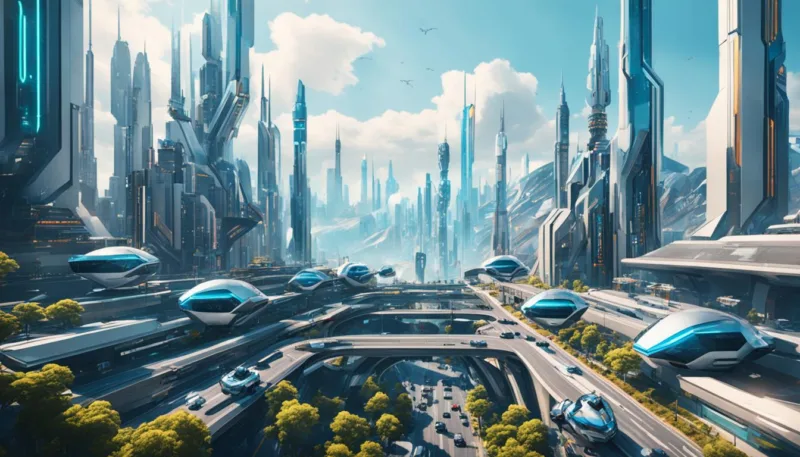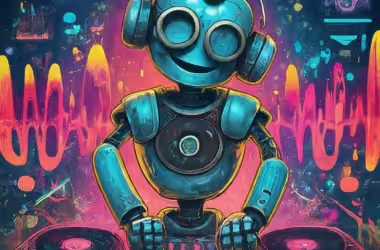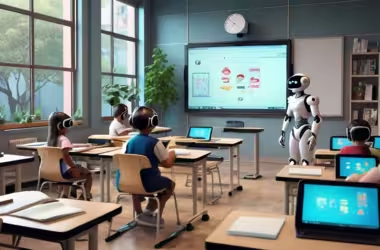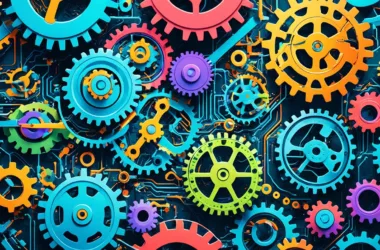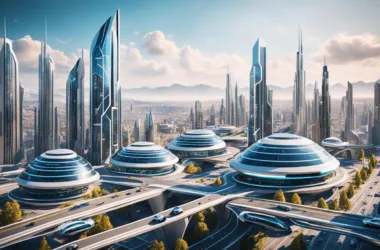The world of artificial intelligence (AI) is changing fast. What used to be just ideas is now in our daily lives. This tech affects many areas like healthcare, finance, education, and media. In the next few years, its role in transportation, national security, and the environment will grow even bigger.
AI’s tools, such as image and voice recognition, understanding language, and learning on its own, are key. They will decide how AI becomes part of our world. These tools can make services faster and more personal in many fields. Yet, we face challenges like job losses and the need for AI that makes fair decisions.
It’s vital we deal with these challenges head-on. We need to make sure AI works fairly for everyone. The AI future is bright and full of possibilities. But we must think about its effects and make ethical choices to benefit all.
Key Takeaways
- AI is transforming sectors from healthcare to finance and beyond.
- Future advancements will impact transportation, national security, and sustainability.
- Core AI functions like machine learning remain crucial to its integration.
- Ethical development and transparency are vital to addressing AI biases.
- Preparing for AI’s societal impact involves tackling job displacement concerns.
The Evolution of AI Technology
Artificial Intelligence has gone through an amazing journey. It started from basic ideas to today’s complex technology. We can see how AI has grown by looking at its history and big achievements.
From Early Days to Present Innovations
The story of AI began in the 1950s with early machine learning. A big step was the Ferranti Mark I’s checkers program in 1951. This showed what AI could do.
Today, we have advanced AI like OpenAI’s ChatGPT. It shows us how AI has evolved to create different kinds of content.
Prominent Milestones in AI Development
Over the years, AI has hit many major milestones. One was in 1997, when IBM’s Deep Blue beat the chess champion Garry Kasparov. It was a huge moment for AI.
Another big achievement was in 2011. IBM’s Watson won in the quiz show Jeopardy!. This showed AI’s power in understanding and using natural language.
These events helped shape today’s AI. Now, AI helps in many fields like health, with RNA sequencing vaccines, and in creating advanced speaking systems.
AI’s Impact on Various Industries
AI technologies are changing many sectors, making work faster and more innovative. These sectors include things like making goods and healthcare. Each one sees big changes thanks to AI.
Manufacturing and Automation
In manufacturing, AI was quickly embraced. It uses AI automation to make work faster and better. Robotic automation is now key in factories for assembling and checking quality. This cuts down on mistakes and increases output.
AI also uses predictive sensors to keep an eye on machines. This helps fix them before they break, avoiding work stoppages.
Healthcare Advancements through AI
AI in healthcare is making a big difference. It makes diagnosing diseases quicker and more precise, leading to timely treatment. AI also speeds up the making of new medicines by predicting how molecules will act. Plus, it helps run clinical trials better.
Another innovation is virtual nursing assistants. They watch over patients all the time, offering care tailored to each person. This helps doctors and nurses by lessening their workload.
AI’s role in the industries keeps growing, especially in manufacturing and healthcare. As AI gets better, it will keep finding ways to work more efficiently and offer custom solutions. This will surely guide the future of these important fields.
Artificial General Intelligence (AGI): The Future of AI
Artificial General Intelligence (AGI) marks a big step beyond today’s AI. With rapid AGI progress, it could surpass human skills. It would learn, adapt, and think in many areas.
Potential Benefits of AGI
Artificial General intelligence could change our world. It could improve healthcare, education, and the way we use energy. Imagine doctors diagnosing illnesses with amazing accuracy, or schools that meet every student’s learning style.
It could also make our energy use smarter and less wasteful. Together, these advances could solve big problems smartly.
Challenges in Developing AGI
Achieving AGI isn’t easy. It’s hard to replicate how humans adapt and understand the world. Creating strong AI with deep human-like thinking requires understanding our thought processes well.
Another big issue is making sure AGI is ethical. We need strong rules to manage risks. This will help AGI grow safely and for the good of all.
Role of AI in Business Automation
AI is changing how businesses work, making processes smoother and more productive. Firms are now using AI tools like chatbots and data analytics to better their workflows. These tools help in making smarter choices and increasing work efficiency.
Increased Efficiency and Productivity
AI tools have made business automation much better, increasing both productivity and efficiency. By handling routine tasks, companies can focus on areas that help them grow. For example, AI in customer service speeds up answering queries, making customers happier and more loyal.
Impact on Workforce and Job Roles
The rise of AI is changing jobs and how we work. It’s leading to new kinds of jobs while making some old ones less needed. As everyday tasks get automated, people need to learn new skills to stay useful in their jobs.
This change means companies must help their employees learn these new skills. By doing so, workers can stay up-to-date in a job market that’s constantly evolving.
Ethical and Social Implications of AI
AI systems are becoming a big part of our lives. It’s important to look at the ethical and social issues they bring. We must make sure AI is fair and just for everyone.
Addressing Bias and Discrimination
AI ethics is key for AI tech development and use. We need to fight biases in AI that harm people because of their race, gender, or where they come from. Making AI ethically means being open about how it’s made and listening to many voices.
AI’s social effects make us think about its role in society. By focusing on ethics, we can make AI help everyone better. This means understanding AI bias and stopping it.
Following AI ethics helps users and builds trust in AI. We need strong rules to make sure AI helps everyone without being unfair. Innovating responsibly is crucial.
In conclusion
It’s vital to consider ethics in AI and tackle biases to make AI that’s fair for all.
AI in Environmental Sustainability
Artificial Intelligence (AI) plays a big role in making the planet greener. It helps us use our resources wisely and cut down on waste. This is key to solving big environmental problems.
Optimizing Resource Usage
AI’s big task in environmental sustainability is making sure resources are used well. It can look at a lot of data to manage water, energy, and more. This is very efficient.
Take smart grid technology as an example. It uses AI to share electricity evenly. This stops energy from being wasted. Such systems are also great for farming. They help save water and grow more food.
Impact on Climate Change
AI is a huge help in fighting climate change. It uses models to watch and predict changes in the environment. This information helps in coming up with ways to reduce global warming. AI tracks the cutting down of forests, predicts extreme weather, and manages clean energy sources.
Yet, AI’s impact on the environment can be good and bad. Creating and running AI models uses a lot of energy. This can undo some of their good effects. So, improving AI green technology is crucial. It will make sure AI helps our fight against climate change more effectively.
AI in Media and Education
AI is changing the game in media and education. It brings personalized learning and advanced content creation tools. Through these, AI makes big impacts in both areas.
Transforming Learning Experiences
AI is making learning more personal. It tailors lessons to meet each student’s needs. This makes for better learning results.
AI tools also help keep education honest and focused. They catch plagiarism and gauge student emotions. These advancements improve education’s quality and effectiveness.
Role in Journalism and Content Creation
In media, AI is a big help too. It powers platforms like Automated Insights for quick news making. AI in journalism is growing. It analyzes data and writes on various topics fast.
This shift leads to a lively and up-to-date news environment. Journalists can respond quicker and cover more ground with AI’s help.
Future of AI: Opportunities and Risks
The future of artificial intelligence (AI) brings both amazing opportunities and big risks. We see a chance for AI possibilities to change how we solve problems and improve efficiency in many areas. One key AI opportunity is making work easier, making processes smoother, and finding new ways to tackle tough issues.
Yet, these improvements come with challenges that affect society. Adding AI to jobs may make some jobs disappear, which worries people about the economy and adapting to new jobs. Also, if we’re not careful, AI could make unfairness worse, so we need strict checks to keep its use fair for everyone. Plus, there are big concerns about privacy since AI can collect and analyze so much personal information.
The outlook for AI advancements shows us a need to carefully balance benefiting from AI and dealing with its downsides. We should work together—tech experts, government folks, and everyone in society. This way, we can make AI work well for us without harming people or creating problems.
Conclusion
Looking back at AI’s growth, we’ve seen it move quickly. It went from an idea to a major tech player. Now, AI changes how we work in healthcare, education, and saving our planet. But, with great power comes big challenges that we must address carefully.
AI’s huge promise means we must watch its effects closely. We need to tackle issues like fairness, bias, and being open about how AI works. Building AI right involves listening to many voices. This ensures it’s fair and doesn’t harm society.
Bringing AI into our world needs us to be smart and careful. We must keep ethics first while using AI to tackle big problems. Looking ahead, we’ll need everyone to work together. This is to make sure AI’s impact is good for us all.
In wrapping up, AI’s future is filled with possibilities. Yet, we must guide it thoughtfully. With a careful and ethical approach, AI’s role in our lives can be bright. We all need to think ahead and be ready for both the opportunities and challenges AI brings.


